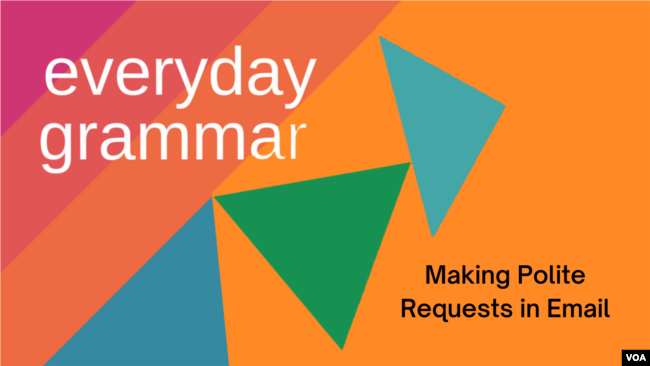今回のVOAはuseful tips 満載です!!
Please の乱用は避けたいですね!
VOAで丁寧な表現を学びましょう!!
続けて、メールでの丁寧な表現-2 をお届けします♬
See you soon!!
メールでの丁寧なお願い(和訳)
Making Polite Requests in Email
July 21, 2022
こんにちは。今週のEveryday Grammarレポートでは、メールでの丁寧なコミュニケーションの取り方、特に依頼をする場合についてお話します。
先日、中国のサミュエルさんから、メールでより効果的にコミュニケーションをとる方法について、ご質問をいただきました。
サミュエルさん、ご提案ありがとうございました。
丁寧な表現を知ることは、特に仕事や学校のために英語でメールをする場合に重要です。
依頼をする際に、メールでのコミュニケーションをより丁寧にするための方法をいくつか考えてみましょう。
丁寧さ
メールで依頼文を書く場合、丁寧さを表現する方法がいくつかあります。
命令形から質問形に変える
依頼を命令で行うのではなく、質問に変えてみましょう。命令形や命令文は、動詞の "you "を使って命令文を作ります。
Please meet me at 5 PM.
と書く代わりに、
Do you want to meet me at 5 PM?
と言うことができます。
ここでは、YESかNOの質問で依頼をします:
Auxiliary Verb + Subject + Main Verb
助動詞 + 主語 +主動詞
この質問は、受け手により丁寧な選択させることができます。受け手は "yes "または "no "と答え、理由を述べたり、別の時間に会うことを提案したりすることができます。
Use of please
上記の例文で、"please "の使い方について何か気づきましたか?
”please”は命令の中で使われていました。そして、より丁寧な質問には使われていません。
私たちは常に丁寧な要求をするためにpleaseを使わなければならないわけではありません。時には "please "の使用は強すぎたり、要求しているように見えることがあります。メールでは、私たちは、書かれたものの調子を常に把握しているわけではありません。
Could you please meet me at 5PM?
この質問は強すぎると思われるかもしれません。
Would you like to meet me at 5PM?
Would like "を使うことで、丁寧な申し出や依頼ができます。ここでは "please "の使用は必要ありません。
法助動詞を使った依頼
Modalsは、可能性、能力、必要性を表現するために使われる動詞です。would, could, will, can などの動詞が含まれます。
質問と一緒に法助動詞を使うことで、依頼をすることができます。"Could" と "Would" はより丁寧な形です。"Can" や "Will" はまだ丁寧な表現ですが、よりカジュアルな、またはインフォーマルな依頼に使われます。
以下は、依頼をする際によく使われるモーダルを使った表現です。
Could
これを手伝ってもらえますか?
来週末にお会いできますか?
Could you help me with this?
Do you think you could meet me later next week?
Would
私を助けてくれる時間がありますか?
後でお店に連れて行ってもらえますか?
Would you have time to help me?
Would you be able to take me to the store later?
Will
空港まで迎えに来てくれますか?
Will you still pick me up from the airport?
Can
カフェに行くなら、コーヒーを買ってきてもらえますか?
Can you get me a coffee if you’re going to the café?
これらの法助動詞を使って依頼をする場合、法助動詞自体に丁寧な意味が付いているため、丁寧さのレベルが理解できるのです。
まとめ
今日は、依頼をより丁寧にするための3つの方法についてお話しました。
命令文を質問に変えることができます。
お願いをするときに "please "を使うか使わないかを選択できます。
そして、依頼を表現するのに役立つ法助動詞使うことができます。
次回は、電子メールの丁寧さについてのレポートを続け、さらに3つの丁寧な依頼をする方法を取り上げます。
Making Polite Requests in Email
Hello. In this week’s Everyday Grammar report, we will talk about how to communicate politely in emails, especially when making requests.
Samuel from China recently wrote to us asking about how to communicate more effectively in email.
Thank you, Samuel for suggesting the idea.
Knowing how to express politeness is important, especially if you are emailing in English for a job or school.
Let’s consider a few ways to make our communication by email more polite when making requests.
Politeness
When writing a request by email, there are several ways to express your politeness.
Turning a command into a question
Instead of making your request as a command, turn the request into a question. Commands or imperatives use the “you” form of a verb to create the command.
Instead of:
Please meet me at 5 PM.
You could say:
Do you want to meet me at 5 PM?
Here we use a yes or no question to make the request.
You can make a yes or no question this way:
Auxiliary Verb + Subject + Main Verb
The question permits the receiver a choice which is more polite. The receiver could say “yes” or “no” and provide a reason or suggest a different time to meet.
Use of please
Did you notice anything about the use of “please” in the above examples?
The word “please” was used in the command. And it was not used in the more polite question.
We do not always have to use please to make a polite request. Sometimes the use of “please” can come across as too strong or demanding. In email, we do not always pick up on the tone of what is written.
Could you please meet me at 5 PM?
This question may come across as too strong.
Would you like to meet me at 5 PM?
Using “would like” is a polite way to offer and make requests. The use of “please” is not necessary here.
Requests with modals
Modals are verbs that are used to express possibility, ability, or necessity. These include verbs like would, could, will, and can, among others.
You can use modals with your question to make a request. “Could” and “Would” are the more polite forms. “Can” and “will” are still polite, but they are used for requests that are more casual or informal.
Here are some common expressions with modals to make your request:
Could
Could you help me with this?
Do you think you could meet me later next week?
Would
Would you have time to help me?
Would you be able to take me to the store later?
Will
Will you still pick me up from the airport?
Can
Can you get me a coffee if you’re going to the café?
When we use these modals to make requests, the level of politeness is understood because the polite meaning is attached to the modal itself.
Closing thoughts
Today, we talked about three ways to make our requests more polite. We can turn a command statement into a question. We can choose to use or not use “please” when making the request. And we can use modals to help express the request.
Next time we will continue our report about politeness in emails, covering three more ways to make polite requests.
Words in This Story
politely – adv. to do something showing good behavior and respect for other people
formal – adj. following established form, custom, or rule
tone – n. a quality, feeling, or attitude expressed by the words that someone uses in speaking or writing
casual – adj. not formal; done without much thought or effort
informal – adj. not requiring serious or formal behavior or dress : suitable for ordinary or everyday use with close friends and family
